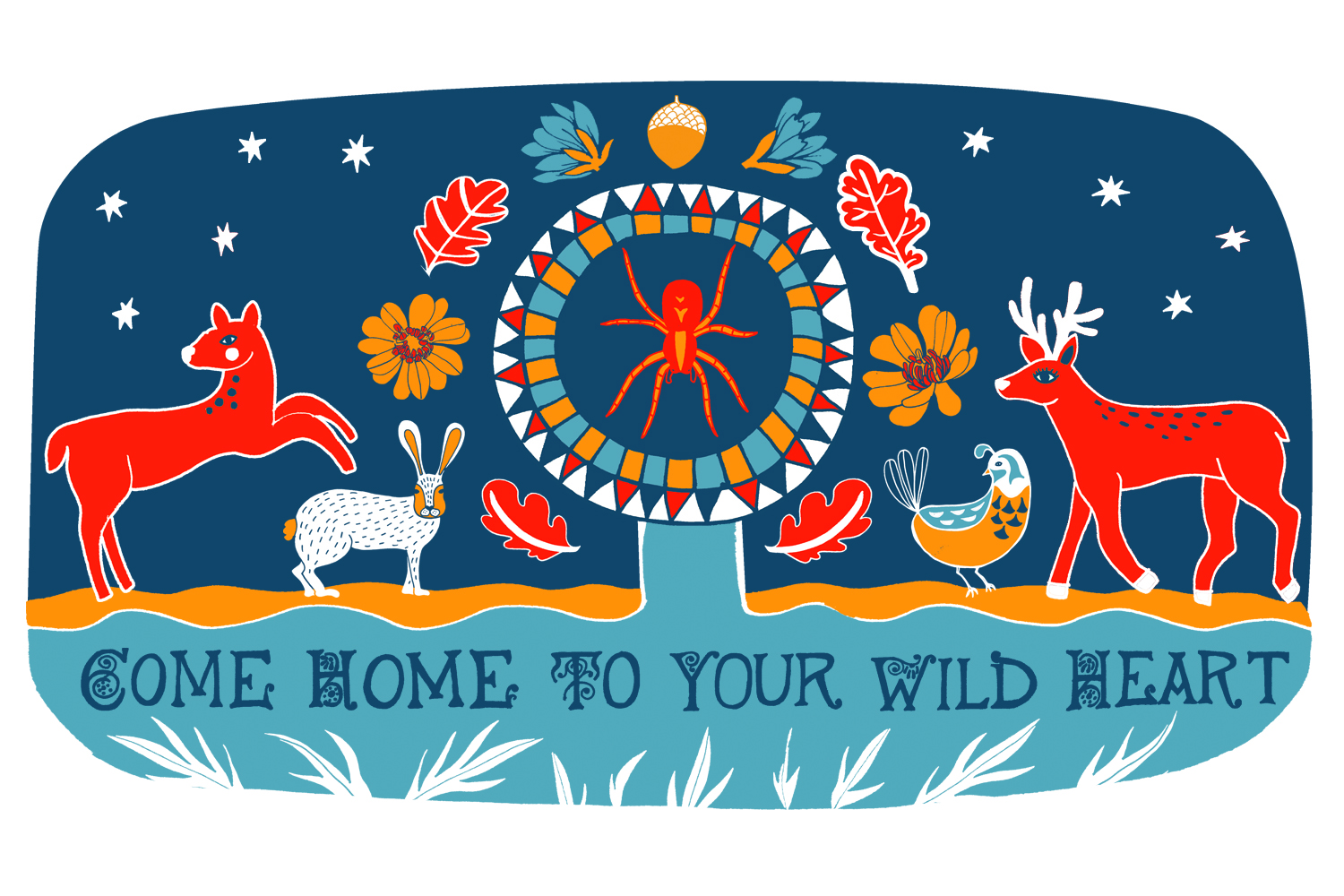Love and Light: Spiritual bypassing, gaslighting and abuse of power
Lately the herbalism community (which I am a part of in my double life) has been reeling from the exposure of prominent teacher Susun Weed for abusing (physically, verbally and emotionally) her students. Colleagues who have been close to her have been aware of the issue for many years, and the problem has been allowed to perpetuate. In great part, this happened because of spiritual bypassing. The essay Why Is Susun so Angry on her blog, reads like a transcript from the Kavanaugh hearings. Susun isn’t angry or abusive, she’s simply fierce, and in order to benefit from her wisdom, you better learn to suck it up. This is gaslighting - a way of denying and belittling the experience of another that thrusts them into self-doubt - and it’s a favorite tactic of people who abuse power.
On the heels of the Weed fiasco comes new reports about another prominent teacher in the herbal world. With the #MeToo movement, we are seeing the unmasking of predators and abusers everywhere in the public sphere, from Bill Cosby to Harvey Weinstein to Louis C.K. All of these perpetrators used gaslighting to hush their accusers. Spiritual bypassing also includes gaslighting, yet is often harder to recognize because of slick public relations in the guise of personal growth and healing. So just what is Spiritual bypassing?
Leaping over those unresolved issues. (source)
There is one story from many years ago that I consider a definitive example of spiritual bypassing. Before this story, I had experienced it mostly in its annoying form - the holier-than-thou individual who looks down on others for being unequal in their knowledge of dharma, dedication to coconut oil, extreme yoga, or copious use of psychedelics as medicine…if you live in Northern California/ the Bay Area, you know what I mean. But this story was next level. (Details are kept vague to protect the identity of people involved).
There was a car accident, a head on collision between a young woman and an old man. The accident was the young woman’s fault, and the old man died. The young woman naturally felt awful and was struggling with grief and guilt. Then she announced that after talking to some friends who, like her, were dedicated to the Law of Attraction, she realized the truth of the matter. The old man had attracted the situation to himself, he had called his own death. The situation wasn’t tragic, and she was blameless. She wiped her hands of it, and went on her merry way.
You probably see the issue here, but let’s spell it out. In one sense, she was blameless. Horrible, tragic things happen, sometimes because of things we accidentally do. It’s a bitter pill to swallow…self-forgiveness. grief work and potentially reparations are part of the healing. Rather than go through this healing process however, she bypassed her experience (and true healing) with a “spiritual” philosophy that allowed her to repress and deny reality.
Spiritual bypassing is often encouraged by those in power. (source)
Spiritual Bypassing can be used with any religious or philosophical structure. The buddhist community I was once part of (Shambhala International) talked about “crazy wisdom” - which was shorthand for extreme, unconventional or unpredictable behavior on the part of the teacher. Unfortunately, this was also used as an excuse for drunken womanizing from founder Chogyam Trungpa Rinpoche, as well as sexual misconduct by his foremost student, Osel Tendzin. Tendzin took leadership of Shambhala after Trungpa died, and seduced students with full knowledge that he was HIV positive. The scandal was never fully resolved and the wound reopened this summer when sexual abuse by current leader Sakyong Mipham Rinpoche was exposed.
It’s an all too familiar story for those with a long term track record in communities of any kind. The psychotherapy world is not immune, especially in transpersonal circles where personal growth is married to spiritual growth. It’s a big enough problem that psychotherapists are encouraged to have copies of the brochure Professional Therapy Never Includes Sex.
Squirrels are born bypassers. (source)
Spiritual bypassing is used to abuse power when someone in a leadership / guru / teacher position uses spiritual or philosophical platitudes to dismiss the authentic experience (often resistance or negative reaction) of the student. Part of the reason spiritual bypassing is so tricky, is because it’s not only something done by perpetrators to victims. Often, the perpetrator is the self, and the victim is also the self - the stomach in knots, the broken heart, the mind spinning in confusion are not taken for being the red flags that they are, and instead are dismissed away, deemed unacceptable, not enlightened, etc. It’s difficult to see through what feels like one’s own complicity, and there are often feelings of confusion and guilt.
Here are some ways to determine if you, or someone you know, is spiritually bypassing:
Your philosophy/spirituality encourages you to denigrate what you consider to be “negative emotions” (anger, grief, fear, sorrow, anxiety) and strive to feel only “love and light”. Detachment, dissociation, intellectualization and repression are some of the ways this is achieved.
The word ego is used a lot, and “it” is seen as something to avoid. Anything associated with your personhood - your desires or bodily messages are seen as “lower”.
“Compassion” for, and defense of, someone who is abusing you or abuses others is seen as “taking the higher path”. Making excuses for them, codependent behavior, and putting their needs above your own well being are examples. (This is not compassion, but rather self-abuse masquerading as philosophy.)
Real life is considered “mundane” and ideals of how relationships, personalities or cultures “should be” are exalted. There’s an avoidance of reality and meeting situations and people right where they’re at.
At the first sign of discomfort, the impulse to immediately turn to consumption of techniques, ceremonies, philosophies, herbal medicines or essences, crystals, exercises etc. are encouraged. These things may be helpful as part of self-care, but if you are immediately leaping over your experience in pursuit something better, this is probably avoidance.
False humility - denying your real (and normal) need to be seen as special or important.
Healthy boundaries are not encouraged/ breaking boundaries is encouraged. “You’re too closed off, closed hearted, your defensiveness is a problem” are some of the weapons used.
Intellectualizing your emotions rather than feeling your emotions (thinking about what you’re feeling, rather than meeting your feelings at a sensory level). Embodiment is discouraged and emotions are considered something to “rise above”.
Law of Attraction is used to avoid personal and social responsibility. Complex issues of race, oppression, inequality, political matters and environmental degradation are “too ego driven” or “too earthly, dark, heavy…” etc. Like in my story about the car crash, suffering is reduced to being the fault of the victim. Let’s be clear here — blaming molestation, slavery, bullying, genocide or oppression on the one who suffers is - pardon my language - privileged bullshit.
Is this ringing some bells? I bet. So what do you do?
While it deserves an article of its own, here are some places to start:
If you are a perpetrator, you first need to acknowledge what you’ve done, take responsibility and apologize. Next, engage in Restorative Justice. From restorativejustice.org: Restorative justice repairs the harm caused by crime. When victims, offenders and community members meet to decide how to do that, the results can be transformational. It emphasizes accountability, making amends, and — if they are interested — facilitated meetings between victims, offenders, and other persons.
What if you’ve been doing it to yourself? Engage in restorative justice with yourself. Your “broken-ness”, pain, trauma, grief, rage and addiction are all just You. I find it helpful to think of the undesirable parts of ourselves as if they are young children. Children need acceptance, presence and love - and so does our suffering. Every time we bypass, we are self-rejecting. Therapy, mindfulness meditation, EMDR and techniques that encourage gentle embodiment (somatic awareness, some types of yoga and massage and being outside) are my go-tos.
Finally, practice self-forgiveness. Having a human heart isn’t for the faint of heart! Suffering is hard, and you, like all beings, are wired to seek relief and pleasure. The good news is you can find your wellbeing without hurting yourself or others.
Instead, you can be this monkey. (source)




